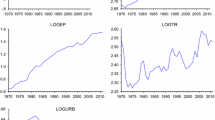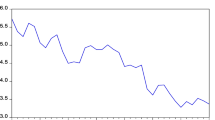Abstract
This paper investigated the relationship between energy consumption, carbon dioxide (CO2) emissions and GDP in Nigeria using autoregressive distributed lag approach to cointegration. The empirical results revealed that there is a long run relationship energy consumption, CO2 emissions and GDP. Both in the long run and short run, CO2 emissions has been found to have a significant positive impact on GDP, meaning that an increase in CO2 emissions facilitates GDP growth. On the other hand, energy consumption shows significant negative impact on GDP in the short run. We therefore, suggested that renewable source of energy such as solar and wind could be explored and considered as an alternative source of energy since Nigeria is well endowed with solar energy. This will assist in reducing CO2 emissions and at the same time sustaining long run growth in GDP.


Similar content being viewed by others
References
Akpan, G. E. (2012). Electricity consumption. Carbon Emissions and Economic Growth in Nigeria, 2(4), 292–306.
Alam, M. J., Begum, I. A., Buysse, J., Rahman, S., & Van Huylenbroeck, G. (2011). Dynamic modeling of causal relationship between energy consumption, CO2 emissions and economic growth in India. Renewable and Sustainable Energy Reviews, 15(6), 3243–3251.
Alkhathlan, K., & Javid, M. (2013). Energy consumption, carbon emissions and economic growth in Saudi Arabia: An aggregate and disaggregate analysis. Energy Policy, 62(2013), 1525–1532.
Ang, J. B. (2007). Are saving and investment cointegrated? The case of Malaysia (1965–2003). Applied Economics, 39(17), 2167–2174.
Ang, J. B. (2008). Economic development, pollutant emissions and energy consumption Malaysia. Journal of Policy Modeling, 30(2), 271–278.
Ang, J. B. (2009). CO2 emissions, research and technology transfer in China. Ecological Economics, 68(10), 2658–2665.
Arouri, M. E. H., Ben Youssef, A., M’henni, H., & Rault, C. (2012). Energy consumption, economic growth and CO2 emissions in Middle East and North African countries. Energy Policy, 45(2012), 342–349.
Bloch, H., Rafiq, S., & Salim, R. (2012). Coal consumption, CO2 emission and economic growth in China: Empirical evidence and policy responses. Energy Economics, 34(2), 518–528.
DFID (Department for International Development). (2009). Impact of climate change on Nigeria’s economy.
Emran, M. H., Shilip, F., & Alam, M. I. (2007). Economic liberalization and price response of aggregate private investment, time series evidence from India. Canadian Journal of Economics, 40(3), 914–934.
Halicioglu, F. (2009). An econometric study of CO2 emissions, energy consumption, income and foreign trade in Turkey. Energy Policy, 37(3), 1156–1164.
Jahangir Alam, M., Ara Begum, I., Buysse, J., & Van Huylenbroeck, G. (2012). Energy consumption, carbon emissions and economic growth nexus in Bangladesh: Cointegration and dynamic causality analysis. Energy Policy, 45(2012), 217–225.
Kaygusuz, K. (2009). Energy and environmental issues relating to greenhouse gas emissions for sustainable development in Turkey. Renewable and Sustainable Energy Reviews, 13(1), 253–270.
Khan, M. A., Khan, M. Z., Zaman, K., Khan, M. M., & Zahoor, H. (2013). Causal links between greenhouse gas emissions, economic growth and energy consumption in Pakistan: A fatal disorder of society. Renewable and Sustainable Energy Reviews, 25(2013), 166–176.
Kraft, J., & Kraft, A. (1978). On the relationship between energy and GNP. Journal of Energy and Development, 3(2), 401–403.
Lotfalipour, M. R., Falahi, M. A., & Ashena, M. (2010). Economic growth, CO2 emissions, and fossil fuels consumption in Iran. Energy, 35(12), 5115–5120.
Menyah, K., & Wolde-Rufael, Y. (2010). Energy consumption, pollutant emissions and economic growth in South Africa. Energy Economics, 32(6), 1374–1382.
Narayan, P., & Smyth, R. (2005). Trade liberalization and economic growth in Fiji. An empirical assessment using the ARDL approach. Journal of the Asia Pacific Economy, 10(1), 96–115.
Ozturk, I., & Acaravci, A. (2010). CO2 emissions, energy consumption and economic growth in Turkey. Renewable and Sustainable Energy Reviews, 14(9), 3220–3225.
PACJA (Pan African Climate Justice Alliance). (2009). The economic cost of climate change in Africa.
Pesaran, H. M., & Shin, Y. (1999). Autoregressive distributed lag modelling approach to cointegration analysis. In S. Storm (Ed.), Econometrics and economic theory in the 20th century: The Ragnar Frisch centennial symposium, 1999.
Pesaran, M. H., Shin, Y., & Smith, R. J. (2001). Bounds testing approaches to the analysis of level relationships. Journal of Applied Econometrics, 16(3), 289–326.
Soytas, U., Sari, R., & Ewing, B. T. (2007). Energy consumption, income, and carbon Emissions in the United States. Ecological Economics, 62(3), 482–489.
Wolde-Rufael, Y. (2006). Electricity consumption and economic growth: A time series experience for 17 African countries. Energy Policy, 34(10), 1106–1114.
Xepapadeas, A. (2005). Economic growth and the environment. In K. G. Mäler, J. R. Vincent (Eds.), Handbook of environmental economics (Vol. 3, pp. 1219–1271).
Zhang, X.-P., & Cheng, X.-M. (2009). Energy consumption, carbon emissions, and economic growth in China. Ecological Economics, 68(10), 2706–2712.
Author information
Authors and Affiliations
Corresponding author
Rights and permissions
About this article
Cite this article
Chindo, S., Abdulrahim, A., Waziri, S.I. et al. Energy consumption, CO2 emissions and GDP in Nigeria. GeoJournal 80, 315–322 (2015). https://doi.org/10.1007/s10708-014-9558-6
Published:
Issue Date:
DOI: https://doi.org/10.1007/s10708-014-9558-6




